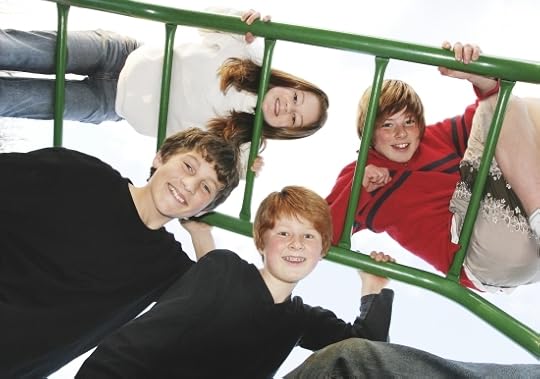Homeschooling and Socialization

Homeschooled children are better socialized than those in public and private school. (click for credit)
When I first started working with homeschoolers, lots of people were concerned about socialization. They wondered how children would “learn” to get along with other children and navigate difficult social settings without being in school. Even before I started researching the matter, I thought the concern was unfounded. After all, school is probably the most artificial social setting a child will ever experience. When are adults ever cloistered away in ghettos, surrounded by people who are the same age? Never. Thus, the idea that students can learn good socialization at school always seemed nonsensical to me.
Nevertheless, people did express concern, so I looked through the academic literature. Even back in the 1990s, there was a wealth of research available on the socialization of homeschoolers. Not surprisingly, the research showed that homeschoolers were better socialized than their publicly- and privately-schooled peers. Perhaps the most interesting study done back then was a Ph.D. thesis by Larry Shyers. In his study, he filmed children from public, private, and home schools in free and structured play. The behaviors of those students were then analyzed by clinical psychologists who didn’t know the schooling backgrounds of any of the children. When Shyers compared the analyses of the homeschooled children to those of the other children, he saw that in nearly all categories of social interaction, the homeschooled children were equivalent to the children from public and private schools. There was only one category in which the homeschooled students scored lower: problem behaviors. As Shyers wrote:
It can be concluded from the results of this study that appropriate social skills can develop apart from formal contact with children other than siblings.
Wow! What a shocker! Children can learn to get along with other people even if they aren’t cloistered away in ghettos, surrounded by people their own age!
Now as I said, even back in the 1990s it was well known that homeschooled students are, on average, better socialized than their peers. Why, then, am I writing about homeschoolers and socialization now? Because someone raised the issue in a Facebook group of which I am a part, and I decided to turn my response into a more detailed blog post.
Let’s start with the academic research, of which there has been a considerable amount. Dr. Richard Medlin, a Professor of psychology at Stetson University, has produced one of the best summaries of this research, which is actually an update of a summary he produced in the year 2000. In his summary, he discusses research done on homeschooling parents’ views about their children’s socialization, the social skills of homeschoolers as measured by standardized assessment tools, emotional and life-satisfaction of homeschooled students as evaluated by the students themselves, the moral and religious views of homeschooled students, and how homeschooled students have adjusted to college or adulthood. He summarizes the results of the studies as follows:
Compared to children attending conventional schools, however, research suggest that [homeschoolers] have higher quality friendships and better relationships with their parents and other adults. They are happy, optimistic, and satisfied with their lives. Their moral reasoning is at least as advanced as that of other children, and they may be more likely to act unselfishly. As adolescents, they have a strong sense of social responsibility and exhibit less emotional turmoil and problem behaviors than their peers. Those who go on to college are socially involved and open to new experiences. Adults who were homeschooled as children are civically engaged and functioning competently in every way measured so far. An alarmist view of homeschooling, therefore, is not supported by empirical research.
While the academic research is important, I have been working with students from public, private, and home schools for most of my career. As a result, I would like to add my personal observations. First and foremost, the reason I work with homeschoolers today is because I experienced homeschool graduates while I was on the chemistry and physics faculty at Ball State University. They impressed me by being better educated than their peers, more mature than their peers, and less likely to get into trouble than their peers.
Once I started working with homeschooling parents and children who were being homeschooled, I continued to be impressed with how well socialized the students are. For example, as a university faculty member, I often visited high schools to speak with students about coming to Ball State University. When I asked for questions, no one would raise a hand, and after class, it was nearly impossible to engage the students in conversation. They just weren’t interested in socializing with someone like me.
When I spoke to student groups at homeschool conventions and asked for questions, hands would shoot up in the air. I even have done a few sessions where all I do is answer homeschooled students’ questions. When students would come to see me at my booth or after a session, talking with them was easy. They were genuinely interested in socializing with me. In fact, I would often have to apologetically tell students that they had to move on, since there was a line of other people waiting to speak with me as well.
Are there socially-awkward homeschooled students? Absolutely. Are their socially-awkward public and private school students? Absolutely. Based on both the academic research and my own personal observations over the past 20+ years, I can say without a doubt that students who are homeschooled are, on average, much better socialized than their peers. If your goal is socialization, then, your best option is homeschooling.
Jay L. Wile's Blog
- Jay L. Wile's profile
- 31 followers



